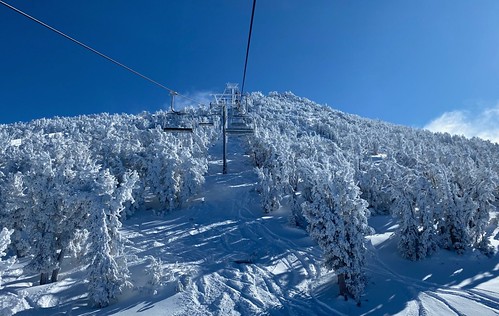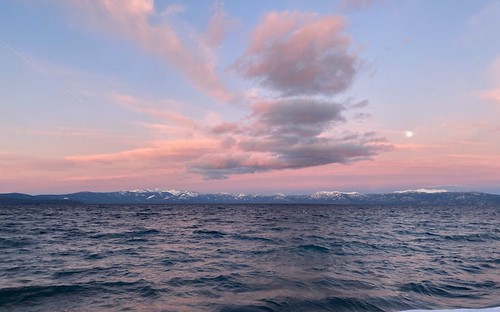It’s 4 AM on a Saturday in December and I’m anxiously maneuvering a little Hyundai out of a dark driveway in the Bay Area. I’m not a morning person, nor a great driver, and this all feels a bit adventurous. As with most things Californian, there’s an app involved, allowing me to rent a good neighbor’s car for the day to drive to Lake Tahoe, where I am eager to go skiing.
Ski slopes may not be the first thing to come to mind when one pictures California. It’s one of the many similarities to Tuscany, where I’m doing my Ph.D. and also go skiing sometimes. As I’ve been excitedly telling everyone for half a year that I’d be coming to California on my Fulbright adventure, I have found out well in advance about all the great skiing places. It also helped that I could get a steep discount on a season pass through UC Berkeley’s skiing club back in September. I knew the slopes were there, I didn’t expect them to be quite the window into California’s weird and innovative soul: there were the two women working for competing rocket launch startups, comparing the differences in office party cultures, and the person showing off their ski goggles custom-fit based on a facial 3D scan taken with their phone. The lifts have a certain retro charm, but there are apps that help you plan your day or compete with your friends and give out quirky virtual badges, such as “space cadet” for riding the Comet and Galaxy lifts in Heavenly.
On my first trip to Squaw Valley, I got adopted in the parking lot by a retired historian, who was a far better skier than I am, yet patiently showed me around the lifts and the slopes for half a day while telling me about his travels through Europe in the 70s and 80s. I would experience this generosity again and again, with perfect strangers offering to share accommodation or a ride back to San Francisco.
After driving for seven hours to and from Lake Tahoe on that first skiing day, getting caught in a snowstorm on the way back, I figured out that maybe an app is not the best solution for everything. The good old-fashioned Bay Area ski bus turns out to be a better idea for a day on the slopes: you can sleep till the destination and wake up to a bagel and cream cheese. They even organize an apres-ski by the side of the bus at the end of the day, where you can compare notes with your fellow riders over a hot chili. #tst4life
I remember a professor telling us about the importance of having a hobby during our PhDs, a hobby being something you enjoy doing without trying to be the best at it. While I’ll always be in awe of the powdered wild chutes of the Sierra Nevada and the brave people who master them, I’m happy to stick to well-groomed slopes, enjoying the chairlift conversations and the breathtaking views of Lake Tahoe. People coming to California, to study or work in tech, either discover skiing here for the first time or bring their passion with them, from Montana or Colorado, or as far away as Britain or Australia. It’s not only the software engineers and rocket scientists either, but there are also the very young lifties from all over Latin America, the stay-at-home mom who recently crashed her Tahoe truck, yet still caught the bus to Lake Tahoe, the car mechanic who retrained as a chairlift engineer and was incredibly enthusiastic about gears, valves and remote sensors, and the political scientist who just had an interview the other day hoping to come to Florence next year on a Fulbright Schuman grant.
Then there were the fellow Romanians, who either fled communist oppression in the 80s or came looking for a better life amid the economic turmoil of the 90s, one an engineer turned lawyer and the other a lawyer turned engineer. And here I am, not fleeing from anything, just enjoying the privilege of pursuing my research in California and a day on the slopes.
Stefan luca IS A 2019-2020 FULBRIGHT STUDENT RESEARCHER IN LAW at the University of California, Berkeley. For nine years Stefan has worked as a human rights lawyer in a variety of settings: with the European Court of Human Rights, the Romanian Government and the European Roma Rights Centre, a major anti-discrimination NGO. His work has included litigation on access to education, housing, and healthcare, in Romania and across Central and Eastern Europe. During his current Ph.D. at the European University Institute in Florence, Italy, Stefan focuses on the regulation of political speech on digital platforms, in particular efforts to address the spread of misinformation.
Articles are written by Fulbright grantees and do not reflect the opinions of the Fulbright Commission, the grantees’ host institutions, or the U.S. Department of State.



